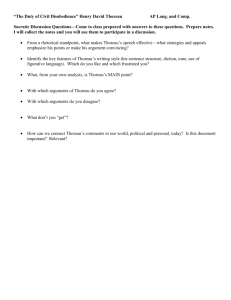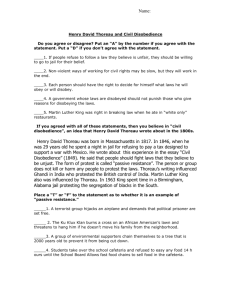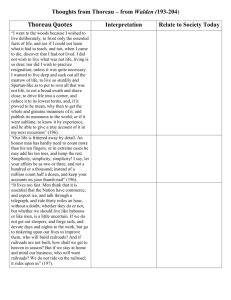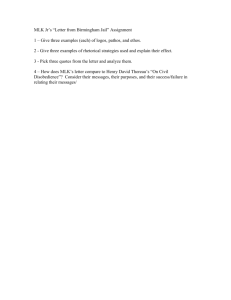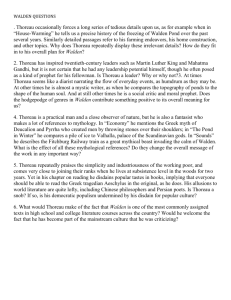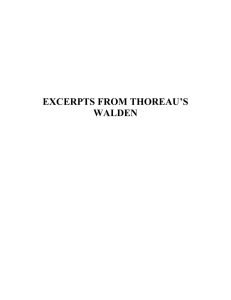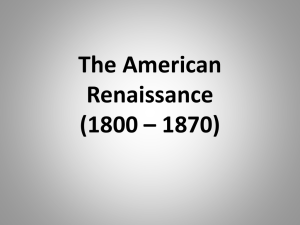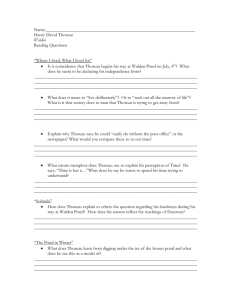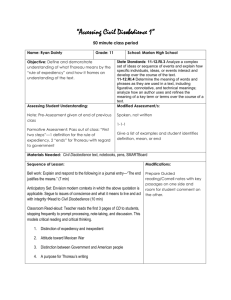Reading 4 “Resistance to Civil Government” by Henry David Thoreau
advertisement
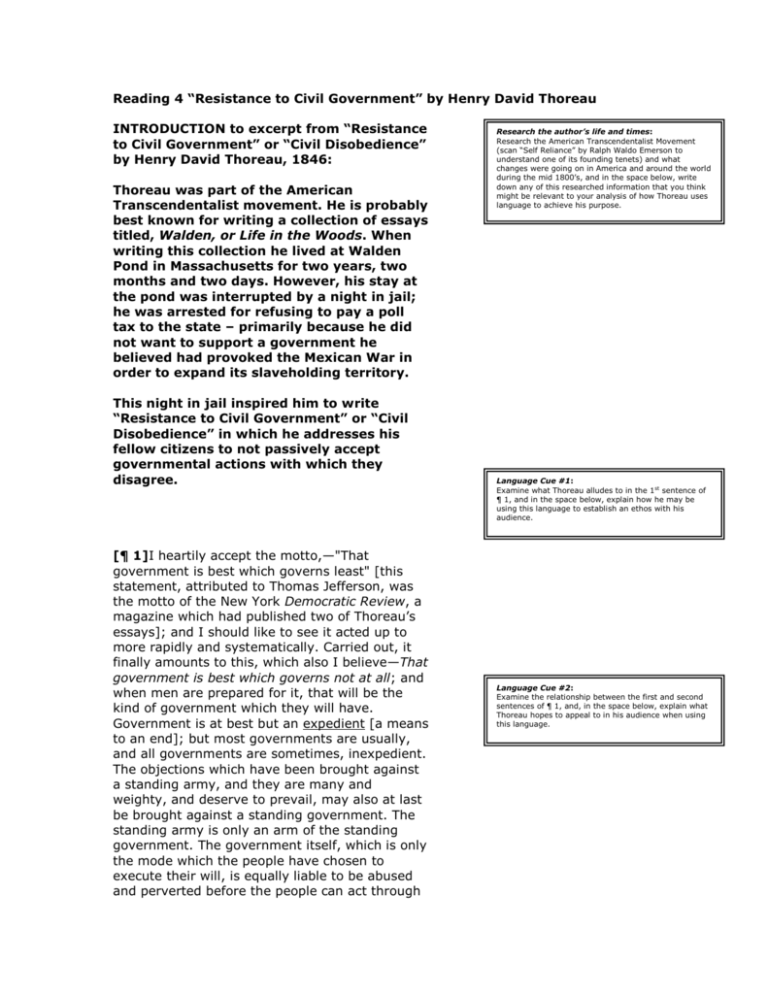
Reading 4 “Resistance to Civil Government” by Henry David Thoreau INTRODUCTION to excerpt from “Resistance to Civil Government” or “Civil Disobedience” by Henry David Thoreau, 1846: Thoreau was part of the American Transcendentalist movement. He is probably best known for writing a collection of essays titled, Walden, or Life in the Woods. When writing this collection he lived at Walden Pond in Massachusetts for two years, two months and two days. However, his stay at the pond was interrupted by a night in jail; he was arrested for refusing to pay a poll tax to the state – primarily because he did not want to support a government he believed had provoked the Mexican War in order to expand its slaveholding territory. This night in jail inspired him to write “Resistance to Civil Government” or “Civil Disobedience” in which he addresses his fellow citizens to not passively accept governmental actions with which they disagree. [¶ 1]I heartily accept the motto,—"That government is best which governs least" [this statement, attributed to Thomas Jefferson, was the motto of the New York Democratic Review, a magazine which had published two of Thoreau’s essays]; and I should like to see it acted up to more rapidly and systematically. Carried out, it finally amounts to this, which also I believe—That government is best which governs not at all; and when men are prepared for it, that will be the kind of government which they will have. Government is at best but an expedient [a means to an end]; but most governments are usually, and all governments are sometimes, inexpedient. The objections which have been brought against a standing army, and they are many and weighty, and deserve to prevail, may also at last be brought against a standing government. The standing army is only an arm of the standing government. The government itself, which is only the mode which the people have chosen to execute their will, is equally liable to be abused and perverted before the people can act through Research the author’s life and times: Research the American Transcendentalist Movement (scan “Self Reliance” by Ralph Waldo Emerson to understand one of its founding tenets) and what changes were going on in America and around the world during the mid 1800’s, and in the space below, write down any of this researched information that you think might be relevant to your analysis of how Thoreau uses language to achieve his purpose. Language Cue #1: Examine what Thoreau alludes to in the 1 st sentence of ¶ 1, and in the space below, explain how he may be using this language to establish an ethos with his audience. Language Cue #2: Examine the relationship between the first and second sentences of ¶ 1, and, in the space below, explain what Thoreau hopes to appeal to in his audience when using this language. it. Witness the present Mexican war, the work of comparatively a few individuals using the standing government as their tool; for in the outset, the people would not have consented to this measure. [¶ 2]This American government—what is it but a tradition, though a recent one, endeavoring to transmit itself unimpaired [not damaged or changed] to posterity [all future generations], but each instant losing some of its integrity? It has not the vitality and force of a single living man; for a single man can bend it to his will. It is a sort of wooden gun to the people themselves. But it is not the less necessary for this; for the people must have some complicated machinery or other, and hear its din, to satisfy that idea of government which they have…. It is excellent, we must all allow. Yet this government never of itself furthered any enterprise, but [except] by the alacrity [eagerness] with which it got out of its way. It does not keep the country free. It does not settle the West. It does not educate. The character inherent in the American people has done all that has been accomplished; and it would have done somewhat more, if the government had not sometimes got in its way. For government is an expedient, by which men would fain [archaic for gladly or willingly] succeed in letting one another alone; and, as has been said, when it is most expedient, the governed are most let alone by it. Trade and commerce, if they were not made of Indiarubber, would never manage to bounce over obstacles which legislators are continually putting in their way; and if one were to judge these men wholly by the effects of their actions and not partly by their intentions, they would deserve to be classed and punished with those mischievous persons who put obstructions on the railroads. [¶ 3]But, to speak practically and as a citizen, unlike those who call themselves no-government men, I ask for, not at once no government, but at once a better government. Let every man make known what kind of government would command his respect, and that will be one step toward obtaining it. [¶ 4]After all, the practical reason why, when the power is once in the hands of the people, a majority are permitted, and for a long period continue, to rule is not because they are most Language Cue #3: Examine the last sentence of ¶ 1, and, in the space below, explain what Thoreau hopes to appeal to in his audience when using this language. Language Cue #4: Note the pronoun and verb that make up the anaphora in sentences 7-9 of ¶ 2. Explain the connotative significance of this pronoun-verb anaphora; consider what effect Thoreau wants this language to have on his audience, especially in terms of how he wants them to view the government. Language Cue #5: Examine the metaphoric language Thoreau employs in the last five line of ¶ 2 to describe “legislators,” and, in the space below, describe what effect Thoreau wants this language to have on his audience, especially in terms of how he wants them to view the government. likely to be in the right, nor because this seems fairest to the minority, but because they are physically the strongest. But government in which the majority rule in all cases can not be based on justice, even as far as men understand it. Can there not be a government in which the majorities do not virtually decide right and wrong, but conscience?—in which majorities decide only those questions to which the rule of expediency is applicable? Must the citizen ever for a moment, or in the least degree, resign his conscience to the legislator? Why has every man a conscience then? I think that we should be men first, and subjects afterward. It is not desirable to cultivate a respect for the law, so much as for the right. The only obligation which I have a right to assume is to do at any time what I think right.... [¶ 5]It is not a man's duty, as a matter of course, to devote himself to the eradication [removing of; purging of] of any, even to most enormous, wrong; he may still properly have other concerns to engage him; but it is his duty, at least, to wash his hands of it [“wash his hands of it” -- an allusion to the Bible story involving Pontius Pilate], and, if he gives it no thought longer, not to give it practically his support. If I devote myself to other pursuits and contemplations, I must first see, at least, that I do not pursue them sitting upon another man's shoulders. I must get off him first, that he may pursue his contemplations too. See what gross inconsistency is tolerated. I have heard some of my townsmen say, "I should like to have them order me out to help put down an insurrection of the slaves, or to march to Mexico—-see if I would go"; and yet these very men have each, directly by their allegiance, and so indirectly, at least, by their money, furnished a substitute.… [¶ 6]Unjust laws exist: shall we be content to obey them, or shall we endeavor to amend [adjust; fix] them, and obey them until we have succeeded, or shall we transgress them at once? Men, generally, under such a government as this, think that they ought to wait until they have persuaded the majority to alter them. They think that, if they should resist, the remedy would be worse than the evil. But it is the fault of the government itself that the remedy is worse than the evil. It makes it worse. Why is it not more apt to anticipate and provide for reform? Why does it not cherish its wise minority? Why does it Language Cue #6: In the space below, explain what Thoreau seeks to appeal to in his audience when he uses this series of rhetorical questions in ¶ 4 as he urges his audience to not passively accept governmental actions with which they disagree. Language Cue #7: Research the allusion in the 1st sentence of ¶ 5, then in the space below, summarize what Thoreau has said in this paragraph and explain what he hopes to appeal to in his audience to urge them to not passively accept governmental actions with which they disagree. Language Cue #8: Examine the rhetorical questions and allusions to historical personages Thoreau employs in ¶ 6, and, in the space below, describe what effect Thoreau wants this language to have on his audience, especially in terms of how he wants them to view the government. ; cry and resist before it is hurt?... Why does it always crucify Christ and excommunicate [exclude throw out] Copernicus and Luther, and pronounce Washington and Franklin rebels?... Language Cue #9: Research the allusion in the 1st sentence of ¶ 7, then, in the space below, paraphrase the two sentences of this paragraph and explain what the use of this language appeals to in the audience to urge them to not passively accept governmental actions with which they disagree. [¶ 7]…I know this well, that if one thousand, if one hundred, if ten men whom I could name—-if ten honest men only—ay, if one HONEST man [an allusion to the story of Sodom and Gomorrah in the Bible – Genesis 18:26-32], in this State of Massachusetts, ceasing to hold slaves, were actually to withdraw from this co-partnership, and be locked up in the county jail therefore, it would be the abolition of slavery in America. For it matters not how small the beginning may seem to be: what is once well done is done forever.... [¶ 8]I have paid no poll tax for six years [a fee some states and localities of the time required from a citizen before he/she could vote; It is now considered unconstitutional]. I was put into a jail once on this account, for one night; and, as I stood considering the walls of solid stone, two or three feet thick, the door of wood and iron, a foot thick, and the iron grating which strained the light, I could not help being struck with the foolishness of that institution which treated me as if I were mere flesh and blood and bones, to be locked up. I wondered that it should have concluded at length that this was the best use it could put me to, and had never thought to avail [gain; benefit] itself of my services in some way. I saw that, if there was a wall of stone between me and my townsmen, there was a still more difficult one to climb or break through before they could get to be as free as I was. I did not for a moment feel confined, and the walls seemed a great waste of stone and mortar.... As they could not reach me, they had resolved to punish my body; just as boys, if they cannot come at some person against whom they have a spite, will abuse his dog. I saw that the State was halfwitted, that it was timid as a lone woman with her silver spoons, and that it did not know its friends from its foes, and I lost all my remaining respect for it, and pitied it…. [¶ 9]The progress from an absolute to a limited monarchy, from a limited monarchy to a democracy, is a progress toward a true respect for the individual…. Is a democracy, such as we know it, the last improvement possible in government? Is it not possible to take a step Language Cue #10: In the space below, paraphrase/interpret what Thoreau’s use of simile and metaphor suggest about the government in the last two sentences of ¶ 8 and, describe what effect Thoreau wants this language to have on his audience, especially in terms of how he wants them to view the government. Language Cue #11: In the space below, explain what the language of ¶ 9 appeals to in Thoreau’s audience in order to urge them to not passively accept governmental actions with which they disagree. further towards recognizing and organizing the rights of man? There will never be a really free and enlightened State until the State comes to recognize the individual as a higher and independent power, from which all its own power and authority are derived, and treats him accordingly.
